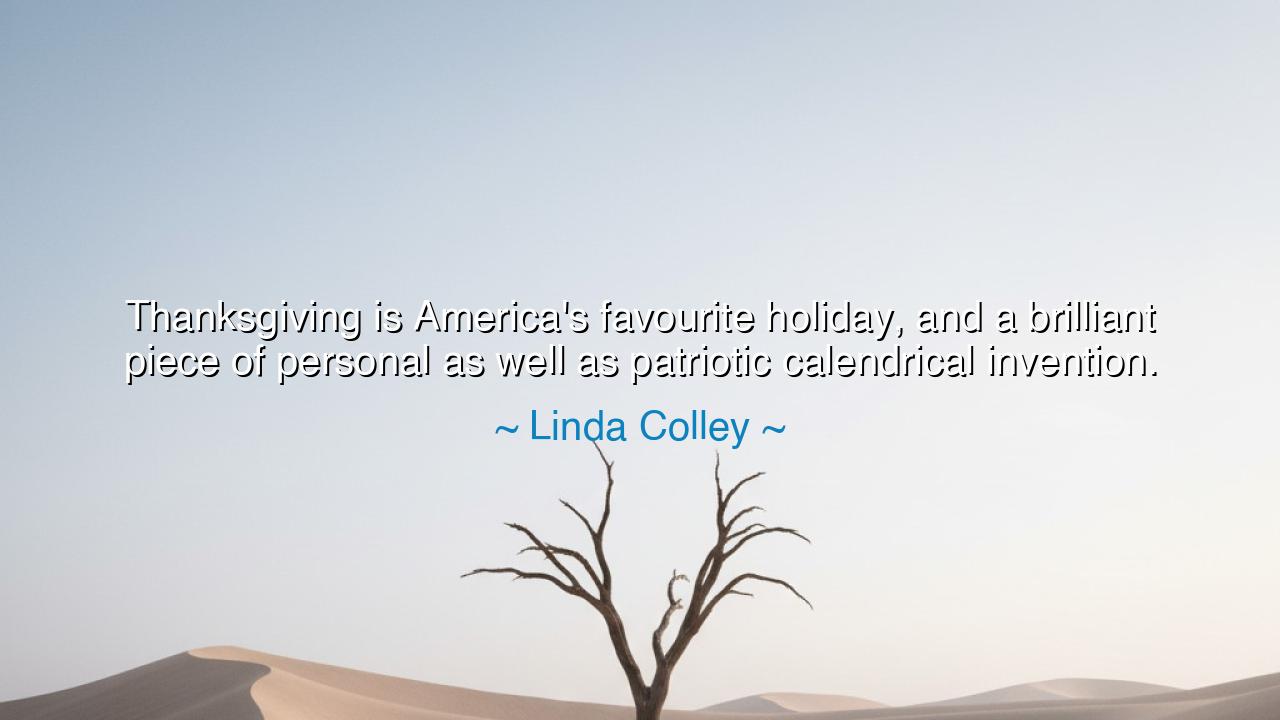
Thanksgiving is America's favourite holiday, and a brilliant
Thanksgiving is America's favourite holiday, and a brilliant piece of personal as well as patriotic calendrical invention.






Linda Colley, historian of nations and their myths, once declared: “Thanksgiving is America’s favourite holiday, and a brilliant piece of personal as well as patriotic calendrical invention.” With this she revealed a truth both subtle and profound—that this day is more than feasting, more than gathering, more than harvest. It is at once personal and patriotic, a sacred invention that binds families to one another and citizens to their country. It is a day that celebrates not only food and family, but the very idea of America itself.
The meaning of her words rests in the duality of private joy and public identity. On the one hand, Thanksgiving is deeply personal—a day of kitchens filled with fragrance, of tables heavy with food, of laughter, stories, and traditions passed through generations. On the other hand, it is national—set deliberately into the calendar as a collective pause, a ritual that unites people across fifty states in one rhythm of gratitude. Unlike many other holidays, it does not center on an individual hero or a battle won, but on the act of giving thanks, which transforms it into both a family hearth and a national altar.
The origin of this calendrical invention lies in moments of trial. Though its roots stretch to the harvest feast of 1621, it was in the dark days of 1863, amid the bloodshed of the Civil War, that President Abraham Lincoln proclaimed a national Thanksgiving. Guided by the urging of writer Sarah Josepha Hale, he declared a day of gratitude in a time of despair, stitching together North and South with a ritual of thanks. Thus, what had been scattered regional custom became a national covenant—proof that gratitude could heal even a land torn by war.
Colley calls it a brilliant invention because it binds together diverse peoples. Unlike Independence Day, which celebrates revolution, or Memorial Day, which remembers sacrifice, Thanksgiving transcends political division. It is not about conquest, but about gratitude; not about power, but about provision. Every family, whether rich or poor, native-born or immigrant, can find themselves in its meaning. The feast is symbolic: food becomes the common denominator of humanity, and thanks becomes the common language of the nation.
The holiday is also patriotic in its quiet way. By marking it into the calendar, the state itself reminds its people that gratitude is a civic duty, as vital as voting or service. To give thanks is to affirm the blessings of the land—its harvests, its freedoms, its promise of opportunity. This does not mean the nation is perfect, but it does mean that its people are bound to remember and to cherish what is good. In this sense, Thanksgiving serves as both mirror and glue: it reflects what unites, and it holds the country together in a shared ritual of memory and gratitude.
The lesson here is powerful: never dismiss traditions as mere habit. For some rituals are crafted with genius, binding together the private and the public, the family and the nation. To keep Thanksgiving faithfully is to honor not only your own loved ones, but your country itself. It is to recognize that the strength of a nation is not only in laws or armies, but in families gathering at tables, in generations giving thanks, in a people who pause to acknowledge their blessings.
Therefore, let Linda Colley’s words be remembered: Thanksgiving is indeed a favourite holiday, because it is both personal and patriotic, both intimate and universal. It is a brilliant invention because it transforms the calendar into a reminder of what holds us together: gratitude, memory, and love. And so, future generations must guard it well—not as a mere feast, but as a sacred rhythm of the nation’s heart, a day when America pauses, breathes, and remembers to be thankful.






AAdministratorAdministrator
Welcome, honored guests. Please leave a comment, we will respond soon